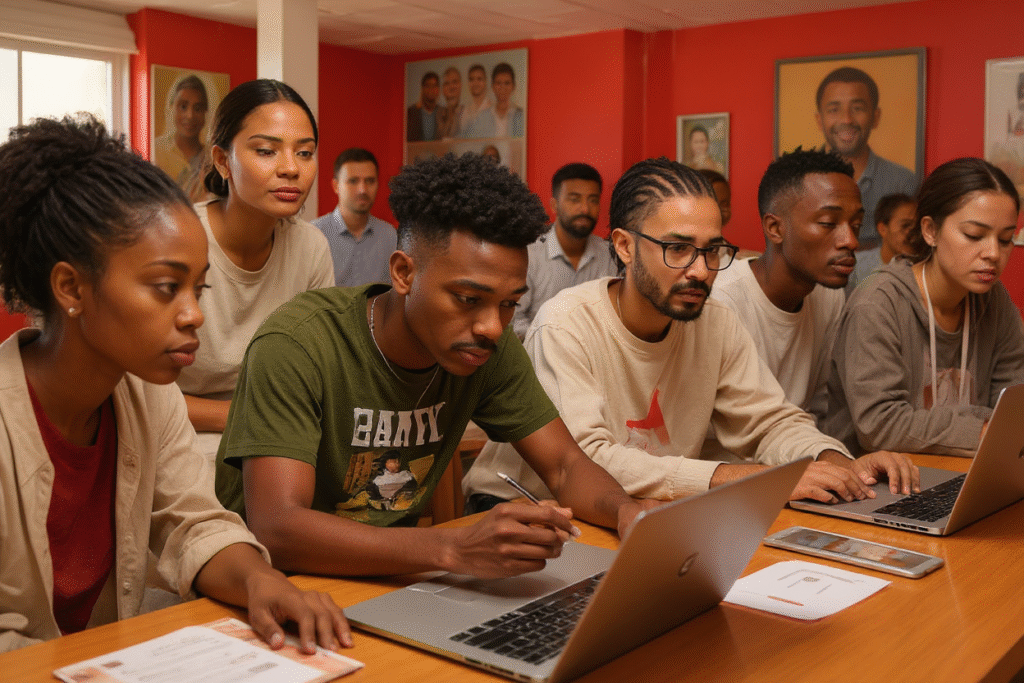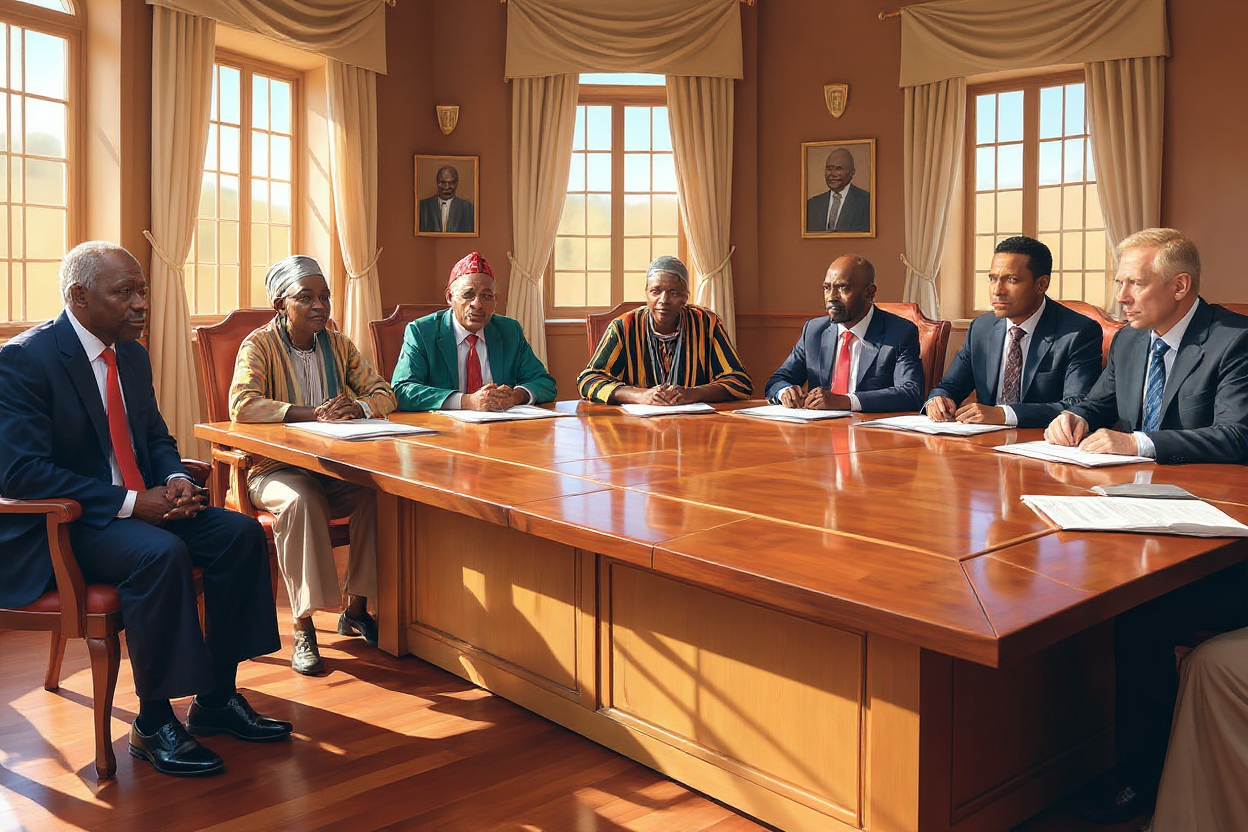Gerontocracy and Its Impact on Contemporary South Africa
1 Introduction to Gerontocracy: Definition and Global Context
Gerontocracy refers to a system of governance or organizational structure where political power is predominantly held by the oldest members of society. The term, derived from the Greek words “geron” (old man) and “kratos” (rule), describes societies where leadership is concentrated among the elderly . This system manifests globally across various institutions—from governments where leaders remain in power into advanced age (as seen in many African nations, the United States, and historically in communist states like China and the Soviet Union) to religious hierarchies like the Catholic Church . While gerontocracy is not inherently undemocratic, it often raises concerns about representation gaps between rulers and the general population, particularly in countries with significantly younger median ages than their leadership.
The conceptualization of gerontocracy has evolved since the term was first coined in 19th-century France by political activist Jean-Jacques Fazy, who criticized the “abuse of the wisdom of old men” in governance . Globally, perspectives on gerontocracy vary considerably across cultures. Some societies venerate their elders and consciously privilege their wisdom through formal power structures, while others view gerontocracy as a barrier to progress, innovation, and representative governance . These divergent perspectives are particularly relevant in the South African context, where traditional respect for elders intersects with pressing contemporary challenges and a complex demographic profile.
2 Historical and Cultural Context of Gerontocracy in South Africa
South Africa’s historical context shapes its current experience with gerontocratic tendencies. The country’s older population today lived through the apartheid era, spending at least half their lives under a regime whose racial segregation policies systematically denied the majority Black African, Coloured, and Indian/Asian populations access to quality education, decent work, and opportunities to save for retirement . This historical dispossession has created enduring socioeconomic disparities that continue to affect older South Africans disproportionately.
The cultural context presents a complex duality. On one hand, many African societies, including South Africa, traditionally emphasize respect for elders and value their wisdom. This perspective is reflected in the Afrobarometer survey finding that 57% of South Africans believe “we should listen more to the wisdom of our elders” for the country to do well . This cultural valuation of age and experience creates fertile ground for gerontocratic tendencies to emerge. On the other hand, South Africa has a notably youthful population—with a median age of 27.6 years—that increasingly demands representation and leadership that reflects their perspectives and priorities . This generational tension creates a challenging dynamic for governance and policy development.
Table: Perspectives on Elder Leadership in Selected African Countries
| Country | Support for Listening to Elders | Support for Listening to Youth | Median Age |
|---|---|---|---|
| South Africa | 57% | 43% | 27.6 |
| Tanzania | 80% | 20% | 17.7 |
| Nigeria | 61% | 39% | 17.9 |
| Tunisia | 29% | 71% | 32.3 |
| Liberia | 85% | 14% | 18.3 |
3 The Pros of Gerontocratic Influence in South Africa
3.1 Stability and Historical Continuity
In a nation that underwent radical transformation following the end of apartheid, elder leadership has provided a measure of stability and continuity. The experience of navigating both the apartheid era and the transition to democracy has endowed South Africa’s older generation with unique insights into governance and conflict resolution. This institutional memory is particularly valuable in a relatively young democracy that continues to confront its painful past while building a more inclusive future.
3.2 Cultural Preservation and Intergenerational Knowledge Transfer
Elder leadership helps preserve cultural knowledge and traditions that might otherwise be eroded by rapid modernization and globalization. In many South African communities, elders serve as custodians of indigenous knowledge systems, languages, and cultural practices that constitute important aspects of the nation’s heritage. This preservation role extends to practical knowledge about community governance structures and conflict resolution mechanisms that predate contemporary political systems.
3.3 Wisdom and Life Experience
The wisdom and experience that come with age represent significant assets in governance. Older leaders have typically weathered various political and economic cycles, potentially offering valuable perspective during times of crisis. This experience factor is frequently cited by proponents of gerontocracy who argue that governing requires judgment that can only be developed through lived experience. In the South African context, where many elders participated in the liberation struggle, this experience includes hard-won knowledge about political organizing and principle-based leadership.
4 The Cons of Gerontocratic Influence in South Africa

4.1 Representation Gaps and Generational Disconnect
South Africa faces a significant generational disconnect between its leadership and its population. While the median age of the country is 27.6 years, its leadership predominantly belongs to older generations who came of age during the struggle against apartheid. This age gap can create blind spots in policy-making regarding issues that disproportionately affect younger generations, such as youth unemployment (which exceeds 60%), digital transformation, contemporary educational challenges, and climate change concerns.
The representation gap extends beyond symbolic representation to practical policy outcomes. Research by Human Rights Watch found that South Africa is failing to provide hundreds of thousands of older people with access to basic care and support services. This failure suggests that even when older individuals hold political power, it does not necessarily translate to policies that benefit all elderly citizens, particularly those from marginalized communities who continue to suffer from apartheid’s legacy.
4.2 Service Delivery Failures and Implementation Gaps
The Older Persons Act, a post-apartheid law that guarantees the rights of older people and provides for community- and home-based care and support services, has not been effectively implemented. The Department of Social Development has failed to allocate sufficient resources for these services, and government targets leave “hundreds of thousands of eligible older people without access” to necessary support . This implementation failure demonstrates how even well-intentioned policies championed by older leaders can fail to translate into tangible improvements for vulnerable elderly populations.
The situation is particularly dire for those requiring full-time care. The Grant-in-Aid—a social security entitlement designed to cover costs of full-time home-based care—provides only R500 (US$27) per month, which would cover less than a single day of care at the national minimum wage . Additionally, lack of awareness about available services means many eligible recipients cannot access them, compounding the neglect experienced by vulnerable elders.
4.3 Economic Implications and Resource Allocation
Gerontocratic priorities potentially influence resource allocation decisions in ways that may not optimally address South Africa’s current challenges. With limited fiscal space, the government faces difficult choices between supporting social programs that primarily benefit older citizens (like pensions and elderly care) and investing in future-oriented initiatives that would primarily benefit younger generations (such as education, digital infrastructure, and youth employment programs). While social grants for the elderly have been crucial in reducing poverty among this demographic, questions arise about the sustainability of this approach and whether it adequately addresses intergenerational equity concerns.
Table: Challenges Facing Older South Africans
| Challenge | Description | Impact |
|---|---|---|
| Inadequate Care Services | Lack of community- and home-based care services | Older people cannot live independently with dignity |
| Housing Insecurity | Inability to afford repairs or rent; long waits for state-subsidized housing | Unsafe living conditions; lack of accessibility modifications |
| Financial Insufficiency | Grant-in-Aid provides only R500/month for full-time care | Covers less than one day of care at minimum wage rates |
| Information Gaps | Lack of awareness about available services and entitlements | Eligible individuals cannot access support they qualify for |
5 Comparative Perspectives: South Africa in Pan-African and Global Context
South Africa’s experience with gerontocracy reflects broader continental patterns. Across Africa, there is strong support for upper age limits for elected officials, with 72% of Cameroonians and 78% of Zimbabweans supporting maximum age limits for their heads of government . This trend appears particularly strong in countries with longer-serving leaders, such as Cameroon (where President Paul Biya, 85, has held power for 40 years) and Zimbabwe (where President Emmerson Mnangagwa, 80, has spent six decades in politics).
Notably, South Africa occupies a middle position in attitudes toward elder leadership among African nations. With 57% of South Africans supporting listening to elders (compared to 85% in Liberia and 29% in Tunisia) , the country appears to be navigating a path between traditional respect for elders and recognition of the need for greater intergenerational dialogue in governance. This positioning reflects South Africa’s higher median age (27.6) compared to many African countries, as well as its history of progressive political movements that have emphasized inclusive governance.
Globally, South Africa’s experience parallels concerns about gerontocracy raised in other contexts. In the United States, for instance, commentators have noted a growing age disparity between leadership and the population, with a median congressional age of 65.3 in the Senate compared to a national median age of 38.9 years . These discussions often highlight concerns about cognitive decline in aging leaders and their potential disconnection from technological innovation and cultural change —concerns that also resonate in the South African context.
6 Pathways Forward: Balancing Respect and Representation
6.1 Policy Recommendations and Structural Reforms
Addressing the challenges of gerontocracy in South Africa requires structural reforms that balance respect for elder wisdom with the need for intergenerational equity. Potential approaches include:
Strengthening implementation of the Older Persons Act through adequate budget allocations, improved service delivery mechanisms, and awareness campaigns to ensure eligible beneficiaries can access entitled services.
Reforming the Grant-in-Aid and other social protections to provide adequate support for older South Africans requiring care, while developing sustainable financing mechanisms that do not preclude investments in youth-oriented programs.
Promoting intergenerational dialogue through formal mechanisms that ensure younger voices are heard in policy discussions affecting their future, potentially drawing on models from countries like Tunisia and Morocco that show higher levels of appreciation for youth wisdom.
Considering age diversity in political representation without resorting to unconstitutional age limits that might conflict with South Africa’s constitutional commitments.
6.2 Intergenerational Solidarity and Knowledge Exchange
A constructive approach to addressing gerontocracy’s challenges emphasizes intergenerational solidarity rather than generational competition. Programs that facilitate knowledge exchange between generations—where elders share historical perspective and wisdom while younger people contribute technological skills and contemporary perspectives—could help bridge current divides. Such approaches recognize that addressing South Africa’s complex challenges requires drawing on the strengths of all generations rather than privileging one perspective over another.
7 Conclusion: Toward Balanced Governance in South Africa
South Africa’s experience with gerontocracy reflects the broader tensions and complexities of a society in transition. The country must honor the contributions of older generations who fought against apartheid while creating space for younger leaders to address contemporary challenges. As one 75-year-old Cape Town resident lamented: “The previous government failed me, and now this government is failing me too” . This sentiment captures the profound disappointment many experience when gerontocratic power does not translate into effective policies supporting aging citizens.
Moving forward, South Africa must develop governance approaches that balance respect for elder wisdom with the urgent need for intergenerational equity. This balancing act requires acknowledging the historical context that created current gerontocratic tendencies while frankly addressing the representation gaps and policy shortcomings that these tendencies have produced. By developing more inclusive governance models that draw on the strengths of all generations, South Africa can better address the needs of both its aging population and its youth majority—building a society that truly honors both wisdom and innovation, both memory and vision.
Disclaimer
This article is intended for educational and informational purposes only. The analysis of gerontocracy and its effects on South Africa is based on widely available research, demographic data, and socio-political studies. It is not an expression of political endorsement or opposition to any individual, political party, or government.
The aim is to present a balanced overview of a governance structure observed in many nations, including South Africa, and to foster understanding of its potential advantages and challenges. The views expressed are analytical and should not be construed as taking a political stance. Readers are encouraged to consult a variety of sources to form their own informed opinions.
🟨🟩🟪


